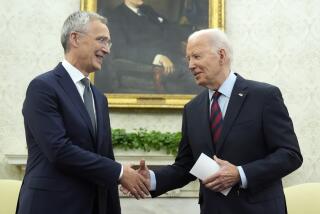Desert Shield Gets Low Priority in Bonn
- Share via
BONN — Faced with staggering bills for German reunification and the need to financially prod along the Soviet military withdrawal, America’s richest ally has done little to aid the U.S. action in the Persian Gulf.
Backing up Operation Desert Shield, the American effort to counter Iraqi President Saddam Hussein’s invasion of Kuwait, has been a low priority in West Germany, and its allies have begun to take notice.
Only Britain and France have made significant contributions of military forces to the U.S.-led buildup in Saudi Arabia, but even the smaller countries of the North Atlantic Treaty Organization, like Portugal, have managed to make a bigger commitment to the effort than West Germany.
Bonn officials contend that the cost of merging with East Germany, a process to be culminated in formal reunification ceremonies Oct. 3, could cost them as much as 100 billion marks ($64 billion) and that the West German constitution prohibits participation in military action on foreign soil.
Still, there is a sense among Western military officials that West Germany is simply not pulling its share of the load.
The NATO supreme commander in Europe, Gen. John Galvin, is quoted in this week’s issue of Der Spiegel magazine as saying that Bonn could do more to support the Middle East operation.
The conservative daily Die Welt said Monday that the federal government’s standard reflex to danger is “to stand back and leave the action to others, and to cloak itself politically in the peaceful virtue of the necessity to be weak.”
West German politicians have frequently cited the constitution as justification for declining to take part in international peacekeeping actions. The restriction forbids the Bundeswehr to take part in aggressive action abroad.
Chancellor Helmut Kohl himself alluded to Bonn’s awkward position among its NATO allies in a weekend radio interview when he called for revision of the constitution--after Dec. 2 elections--to allow military participation in U.N. peacekeeping efforts.
NATO allies have developed the view that West Germany prefers to shirk defense duties abroad, Kohl said, adding: “This reflects neither the moral stature of our republic nor, I believe, our own conception of international solidarity.”
Secretary of State James A. Baker III appealed to NATO foreign ministers in Brussels for more support in the Mideast effort. The alliance’s secretary general, West German Gen. Manfred Woerner, told reporters “there is a feeling that the allies can and should do more.”
Bonn government sources disclosed Monday that up to 500 million marks ($320 million) might soon be made available to help countries like Turkey, Jordan and Egypt that have suffered financially because of the international embargo against Iraq.
Only about 100 million marks ($64 million) would be earmarked for support of U.S. troops massed in Saudi Arabia, the sources said. The U.S. military action is costing Washington about $1 billion a month.
Saudi Arabia, the United Arab Emirates and the exiled government of Kuwait have pledged $12 billion this year to the military effort.
West Germany so far has contributed only technical assistance to the operation, such as lending the U.S. Army 10 specially equipped vehicles for detecting contaminants resulting from the use of chemical weapons.
Meanwhile, Britain and France have deployed dozens of sophisticated surveillance and fighter aircraft and thousands of troops. NATO allies Spain, Belgium, the Netherlands, Denmark, Norway, Portugal and Italy have agreed to send ships or provide transport for U.S. forces.
Bonn has committed 12 billion marks ($7.7 billion) to aid the Soviet Union in its withdrawal of 370,000 troops from East Germany by 1994. Moscow insisted on the money to finance the move and the retraining of the displaced soldiers, plus the construction of new housing for them.
More to Read
Sign up for Essential California
The most important California stories and recommendations in your inbox every morning.
You may occasionally receive promotional content from the Los Angeles Times.













